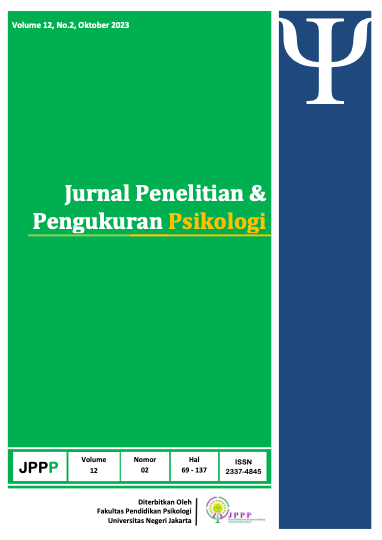Reliability and Validity Test of the Good Character Scale (SKB) for High School/Equivalent Students in Indonesia
DOI:
https://doi.org/10.21009/JPPP.122.06Keywords:
Good Character, Character Education, High SchoolAbstract
Good character is a congruence of thought, feelings and behaviors that are in accordance with principles of morality. Since 2016 Indonesian education system attempts to develop good character in students using principles for encouraging character education (PPK, Penguatan Pendidikan Karakter). The principles of PPK are based on Pancasila, Indonesia national ideology. These five principles are religiosity, nationalism, independence, cooperation, and integrity. Currently, there are no instrument for measuring good character in accordance with the principle of PPK. This study aims to develop a reliable and valid measuring tool for good character that can be used for measuring good character in Indonesian high school students. In the development of this measurement, this study tests the reliability with discriminatory item analysis using SPSS v.21. Construct validity was measured using confirmatory factor analysis with JASP emulation MPlus, from which group norm was formed with average of 10 and standard deviation of 3. The subjects of this study are 728 Indonesian high school students. The result of this study show that the instrument can be deemed reliable with Cronbach alpha of 0.892. This instrument also shows model fit p-value of 0.000, SRMRS of 0.078 and GFI of 0.957, which can be interpreted as a reliable in term of measurement.
References
Baehr, J. (2017). The Varieties of Character and Some Implications for Character Education. Journal of Youth and Adolescence, 46(6), 1153-1161. doi:10.1007/s10964-017-0654-z
Brown, J.D. (1 April 1999). Standard error vs. Standard error of measurement. Shiken: JALT Testing & Evaluation SIG Newsletter, 20-25. Retrieved December 17, 2020, from http://hosted.jalt.org/test/PDF/Brown4.pdf
Chadha, N. K. (2009). Applied Psychometry. New Delhi: Sage Publications.
Crocker, L. M., & Algina, J. (2008). Introduction to classical and modern test theory. Mason, OH: Cengage Learning.
Dempster, M. 2020. An exploration of character education as a tool of ‘moral repair’ in the developing world. Journal of Religious Education. https://doi.org/10.1007/s40839-020-00107-5 diakses pada 21 September 2020.
Elias, M. J., Nayman, S. J., & Duffell, J. C. (2018). Scaling Up High-Quality Social-Emotional and Character Development in All Schools: A Set of Policy Recommendations to the US Secretary of Education. The Springer Series on Human Exceptionality Emotional Intelligence in Education, 321-350. doi:10.1007/978-3-319-90633-1_12
Fatoni, A. (2017). The strategy of character education in the globalization era. International Journal of Scientific & Technology Research Volume 6, ISSUE 04, 112-114
Field, A. (2018). Discovering Statistics using SPSS 5th ed. London: SAGE Publication Inc.
Hair, et al. (2019). Multivariate data analysis. Andover: Cengage Learning.
Ismail, I., Thalib, S., Samad, S., & Mahmud, R. (2016). The Development of Character Education Model to Improve Students’ Academic Independence in Islamic Boarding School in Sinjai District, Indonesia. The New Educational Review, 46(4), 29-39. doi:10.15804/tner.2016.46.4.02
Jerome, L., & Kisby, B. (2019). The Rise of Character Education in Britain. doi:10.1007/978-3-030-27761-1
Rep. Konsep dan Pedoman Penguatan Pendidikan Karakter Kementerian Pendidikan dan Kebudayaan Republik Indonesia at 1-64 (2017).
Kumar, R. (2011). Research Methodology Third Edition. India: SAGE Publication.
Karakter Kementerian Pendidikan dan Kebudayaan Republik Indonesia. (28 September 2020). Penguatan Pendidikan Karakter Jadi Pintu Masuk Pembenahan Pendidikan Nasional. https://www.kemdikbud.go.id/. Diakses dari https://www.kemdikbud.go.id/main/blog/2017/07/penguatan-pendidikan-karakter-jadi-pintu-masuk-pembenahan-pendidikan-nasional
Layyinah, & Roebianto A. (2020). Uji Validitas Konstruk Pembentukan Karakter Moral Remaja. JP3I (Jurnal Pengukuran Psikologi dan Pendidikan Indonesia) 9(2), 2020, 99-110. DOI: http://dx.doi.org/10.15408/jp3i.v9i2.XXXXX http://journal.uinjkt.ac.id/index.php/jp3i
Lickona, T. (1991). Educating For Character: How Our Schools Can Teach Respect and Responsibility. New York: Bantam.
Nunally, J.C. and Bernstein, I.H. (1994). The Assessment of Reliability. Psychometric Theory, 3, 248-292.
Pala, A. (2011). The need for character education. International journal of social sciences and humanity studies Vol 3, 23-32.
Taqwiem, A. (2018). Urgency of Character Education Based on Multiculturalism. Proceedings of the 1st International Conference on Social Sciences Education - "Multicultural Transformation in Education, Social Sciences and Wetland Environment" (ICSSE 2017). doi:10.2991/icsse-17.2018.3
Urbina, S. (2004). Essentials of Psychological Testing. Hoboken, NJ: Wiley.
Yudiana, W. (2020, October 16). Confirmatory Factor Analysis (CFA) Mata Kuliah : Statistik Lanjut PSPP801305. Lecture. Universitas Indonesia
Yu, Y. (2018). Comparing Moral Education Models at a Military Academy in Taiwan. Journal of Academic Ethics, 16(2), 173-193. doi:10.1007/s10805-018-9301-x







